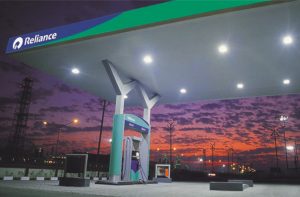Reliance already independently runs 1,343 petrol pumps in India, BP received a licence to set up 3,500 fuel retail outlets in India in October 2016.
British oil producing giant BP Plc and Reliance Industries Ltd (RIL) are intending to mutually set up around 2,000 petroleum pumps in India throughout the following three years, as per two individuals mindful of this development. The correct game plan of the endeavor is being worked out and would be chosen in a couple of months, a Reliance official, one of the two individuals refered to above, said on state of secrecy.
While Reliance as of now freely runs 1,343 petroleum pumps, BP got a permit to set up 3,500 fuel retail outlets in India in October 2016.
India is one of only a handful couple of major worldwide markets where fuel request is developing and has pulled in consideration from outside fuel retailers looking to pick up a foothold in a nation where fuel retailing is dominated by state-run organizations.
British Petroleum is Reliance Industries partner in its exploration and production ventures in the country. In February 2011, London-based British Petroleum purchased a 30% stake in 21 oil and gas generation sharing contracts worked by RIL for $7.2 billion. The two are additionally partners in India Gas Solutions Pvt. Ltd, an equivalent joint venture for sourcing and promoting of gas in the nation.
“We had a memorandum of association signed with BP but there was no definitive agreement. However, we will continue to expand our retail footprint and the marketing. It is in line with what we had planned to do,” V. Srikanth, joint chief financial officer of RIL, said after the company reported its second-quarter earnings on 17 October.
On his visit to India a week ago, Bob Dudley, BP’s gathering CEO, said “Our association with Reliance is incredible, we just got the opportunity to get the correct kind of terms here with retailing.”
To get a permit to retail auto fuel in India, an organization ought to put at least ₹2,000 crore in exploration or production, refining, gas or products pipeline, or terminals. RIL has licenses to open 5,000 petroleum pumps in India and plans to twofold its piece of the pie in the fuel retail market. It as of now has a 6% share in India’s fuel retail industry.
RIL and BP are wanting to set up their retail outlets on the national highways. “Looking at the fuel demand scenario in the country, RIL is optimistic about the retail business. Presence on the highways will be attractive for RIL as it is an underserved segment in the country,” said the first person cited earlier.
Amid the September quarter, RIL revealed 10% and multi year-on-year volume development in diesel and petrol sales, individually.
RIL, which had a 12% piece of the overall industry in fuel retailing in 2005, saw its piece of the overall industry slip to under 0.5% of every 2014, by when it had closed the greater part of its petroleum pumps after deals dove as it couldn’t coordinate the financed cost offered by state-run fuel retailers. RIL had burned through ₹5,000 crore in setting up 1,470 retail outlets somewhere in the range of 2004 and 2006.
State-claimed Indian Oil Corp. Ltd (IOCL), Bharat Petroleum Corp. Ltd (BPCL) and Hindustan Petroleum Corp. Ltd (HPCL), figured out how to offer fuel below production cost due to government subsidies.
Recently current government deregulated oil and diesel rates in June 2010 and October 2014, individually, RIL started reviving its retail outlets in stages, step by step raising its piece of the pie to around 5%. At present, Reliance, Essar Oil and Shell India together have a 10% share of the fuel retail market, according to market experts.
In any case, the administration’s ongoing move to cut costs of oil and diesel by ₹2.50 a liter each, some portion of it as an extract obligation decrease of ₹1.50 per liter and the rest of the ₹1 per liter to be consumed by state-run fuel retailers, could end up being to be a dampener for the private sector players in the industry.
As Dudley included, “I surmise that value controls are a sort of thing that won’t be useful for the area in the more drawn out term.”
India has 57,312 petrol pumps, and Indian Oil, BPCL and HPCL are set to extend their system after a gap of nearly four years, by adding nearly 50,000 fuel outlets over the next three years.
